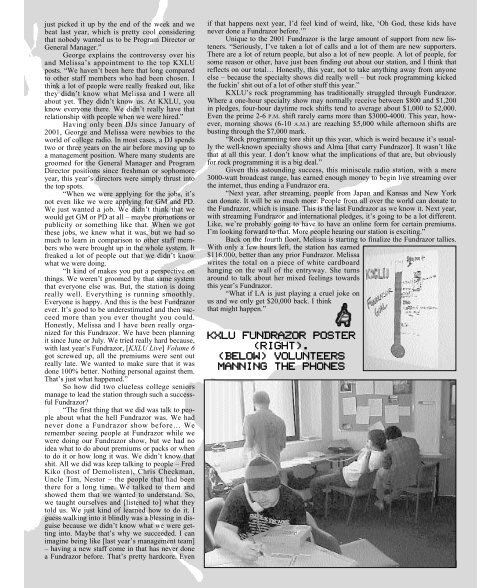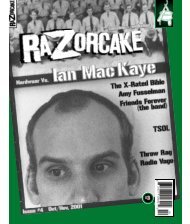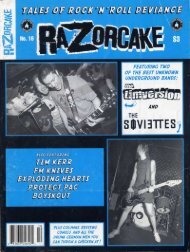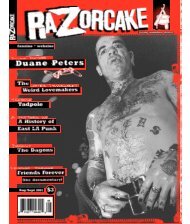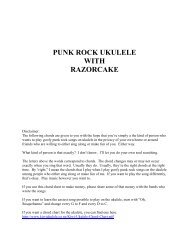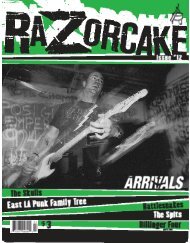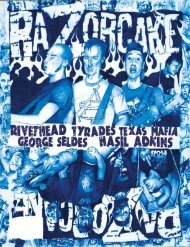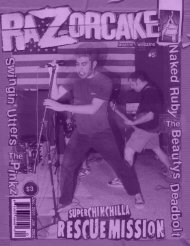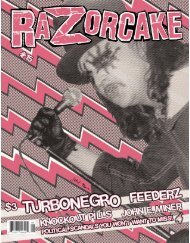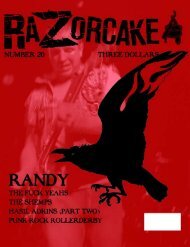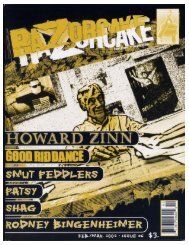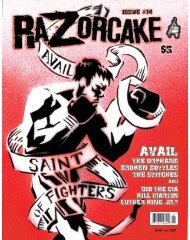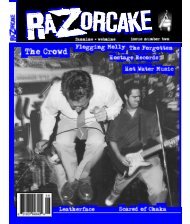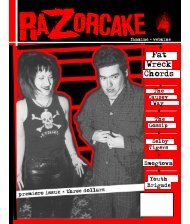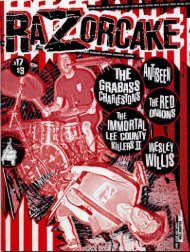Mixed CDs and their cassette predecessors,while often discouraged by the faculty advisors,have always been a hit premium at the station.However, the popularity of the custom-made CDshas never been as popular as this year, where anestimated 50%+ of the pledges are for discs withnames like Bret’s Punk Rock Lunch and Dan’sRock You To Death compilation. George explainsthe controversy over the mixed CD.“We were told it was kind of bad. From ourunderstanding, if you don’t announce who’s on it,if you just say it’s a mixed comp, like a mixedtape [then you don’t violate any copyrights thatthe bands on the comp may have]. But Bret’scomp was announced by Rev. Dan so many times.Bret was kind of like, none of these bands aregoing to care. It’s not like Dr. Know’s lawyer isgoing to call us. I think it’s cool. We’ll cross thatbridge when we come to it.”Junior Frances, a native of Jamaica and aprominent MC within Los Angeles’s reggaescene, is taking notes during his conversation withBen. He is looking for ways to improve his totalpledges next year, likening his mentality toMichael Jordan’s quest for perfection on the basketballcourt. He remarks that his Fundrazor showfrom last Friday did “okay” with a grand total ofabout $1,500 in pledges. Last year, he earnedroughly $1,000.Ben tells Junior that he has been callingeveryone he knows to remind them aboutFundrazor, sometimes jotting down pledge formsfor Glossolalia. “I’m calling about twenty of myfriends to pledge. I called everyone I know. I’vealready made $100 for him before the show evenstarted.”By 11:00 P.M., Glossolalia has ended andChuck Lunch and friends grab the microphones todo this year’s pitch for the weekly Darth Vader’sDiscotheque, a show loosely described by its hostas “punkmetalstonerdoomgrindhardcorenoiseradio!”The booth is cramped with records andCDs. We take our seats behind microphones thatsmell of dentures packed with week-old foodproducts as Chuck Lunch and George try to woolisteners with a deft comedic sense. They are discussingthe KXLU button, available for a $5pledge.Chuck describes the pin for the audience.“It’s just the KXLU bird-poop logo, y’know withthe splotch. I believe… is the button black orwhite.”“I believe that the button is white with ablack splotch,” says George.“So, it’s like the bird took lots of PeptoBismol.”“Or it’s the anti-bird,” adds former Germsdrummer Don Bolles, who has just run into thebooth with a pledge sheet.“Or, it’s a bird from a black and whitefilm,” concludes George.Chuck Lunch is ready to move along beforethe conversation becomes ridiculous. “So you canget the KXLU button for practically nothing. Or,you can get the KXLU headband and wristbandset for all of you straight-edge kids out there. Putthem on your head, pick up change, do theGorilla. What are the other cool straight-edgedances, George?”“Anything that is from the Kung Fu realm.KXLU PROGRAM DIRECTOR GEORGE CORONATALKING TO TIM ROBBINS.The spinning arm thing.”“They do like Riverdance kind of stuff, right?” Don Bolles questions thehosts. “Except it’s a little bit more frenetic.”George answers him. “Lots of arm swinging.”Again, Chuck Lunch is quick to change the subject. He announces the station’sphone number, adding, “If you don’t like this kind of music, we can alwaysreplace this show with this.”“The Sound of Music” blasts over the airwaves for a few seconds beforeChuck proceeds to mount his proverbial soapbox.“The choice is yours, my friend. You think we’re kidding, but this Fundrazoris actually our report card. We’re showing the powers that be that our shows areactually worthwhile and we deserve to be on the air. Your vote is you calling upand donating money. Oh, there goes the phone. Nice. So, call up at… and showyour love to the Darth Vader’s Discotheque. Let’s take a little musical break, sincethe phone is ringing.”Chuck’s musical break consists of a grindcore song that lasts precisely onesecond. Upon his return, the host and his guests begin to read lists of premiumsfrom a catalogue-style list provided by management. It’s the same list that listenershave heard for the past five days, save for a few sold-out items that have been omittedand packs of Pessimiser records that appear exclusively on this show. Behindthe caffeinated voices is a string of songs easily recognizable as SuicidalTendencies’ “Send Me Your Money,” the Ojay’s “Money,” and a host of othertunes relating to the almighty dollar.“We’ll take your Coinstar receipts, for the love of God,” Chuck exclaims ashe is inundated with pledge sheets. Bret is screaming in the background that theyneed help with the phones, and Chuck cues Fudgetunnel’s cover of Cream’s“Sunshine of Your Love” for a listener who pledged $200. We run into the office totake a few more pledges before the song ends and the microphones are turned ononce again. Chuck thanks a slew of donors and tries to define grindcore for onepledgee as the hour closes. The Blues Hotel crew is standing in the doorway, readyto take their posts for a three-hour assault on the non-donors of Los Angeles. Chuckis cross fading snippets of Robert Goulet and Repulsion as he asks the audience“What side are you on? Are you on this side… or this side? The choice is yours, myfriend, do you want this or that? Robert Goulet or Repulsion, the choice is yours,”before closing the show by naming all of the donors Romper Room-style.During the final two days of Fundrazor, pandemonium ensues at the radio stationas the staff realizes that they may actually hit their goal. By the four o’clockhour on Thursday afternoon, the numbers punched in to the calculator add up to$100,000.“We partied on the air” says George. “When it first started, we did reallywell. The first was fucking amazing… Earlier in the week, it gotslower. We totally thought that we would be short of the goal. We57
just picked it up by the end of the week and webeat last year, which is pretty cool consideringthat nobody wanted us to be Program Director orGeneral Manager.”George explains the controversy over hisand Melissa’s appointment to the top KXLUposts. “We haven’t been here that long comparedto other staff members who had been chosen. Ithink a lot of people were really freaked out, likethey didn’t know what Melissa and I were allabout yet. They didn’t know us. At KXLU, youknow everyone there. We didn’t really have thatrelationship with people when we were hired.”Having only been DJs since January of2001, George and Melissa were newbies to theworld of college radio. In most cases, a DJ spendstwo or three years on the air before moving up toa management position. Where many students aregroomed for the General Manager and ProgramDirector positions since freshman or sophomoreyear, this year’s directors were simply thrust intothe top spots.“When we were applying for the jobs, it’snot even like we were applying for GM and PD.We just wanted a job. We didn’t think that wewould get GM or PD at all – maybe promotions orpublicity or something like that. When we gotthese jobs, we knew what it was, but we had somuch to learn in comparison to other staff memberswho were brought up in the whole system. Itfreaked a lot of people out that we didn’t knowwhat we were doing.“It kind of makes you put a perspective onthings. We weren’t groomed by that same systemthat everyone else was. But, the station is doingreally well. Everything is running smoothly.Everyone is happy. And this is the best Fundrazorever. It’s good to be underestimated and then succeedmore than you ever thought you could.Honestly, Melissa and I have been really organizedfor this Fundrazor. We have been planningit since June or July. We tried really hard because,with last year’s Fundrazor, [KXLU Live] Volume 6got screwed up, all the premiums were sent outreally late. We wanted to make sure that it wasdone 100% better. Nothing personal against them.That’s just what happened.”So how did two clueless college seniorsmanage to lead the station through such a successfulFundrazor?“The first thing that we did was talk to peopleabout what the hell Fundrazor was. We hadnever done a Fundrazor show before… Weremember seeing people at Fundrazor while wewere doing our Fundrazor show, but we had noidea what to do about premiums or packs or whento do it or how long it was. We didn’t know thatshit. All we did was keep talking to people – FredKiko (host of Demolisten), Chris Checkman,Uncle Tim, Nestor – the people that had beenthere for a long time. We talked to them andshowed them that we wanted to understand. So,we taught ourselves and [listened to] what theytold us. We just kind of learned how to do it. Iguess walking into it blindly was a blessing in disguisebecause we didn’t know what we were gettinginto. Maybe that’s why we succeeded. I canimagine being like [last year’s management team]– having a new staff come in that has never donea Fundrazor before. That’s pretty hardcore. Evenif that happens next year, I’d feel kind of weird, like, ‘Oh God, these kids havenever done a Fundrazor before.’”Unique to the 2001 Fundrazor is the large amount of support from new listeners.“Seriously, I’ve taken a lot of calls and a lot of them are new supporters.There are a lot of return people, but also a lot of new people. A lot of people, forsome reason or other, have just been finding out about our station, and I think thatreflects on our total… Honestly, this year, not to take anything away from anyoneelse – because the specialty shows did really well – but rock programming kickedthe fuckin’ shit out of a lot of other stuff this year.”KXLU’s rock programming has traditionally struggled through Fundrazor.Where a one-hour specialty show may normally receive between $800 and $1,200in pledges, four-hour daytime rock shifts tend to average about $1,000 to $2,000.Even the prime 2-6 P.M. shift rarely earns more than $3000-4000. This year, however,morning shows (6-10 A.M.) are reaching $5,000 while afternoon shifts arebusting through the $7,000 mark.“Rock programming tore shit up this year, which is weird because it’s usuallythe well-known specialty shows and Alma [that carry Fundrazor]. It wasn’t likethat at all this year. I don’t know what the implications of that are, but obviouslyfor rock programming it is a big deal.”Given this astounding success, this miniscule radio station, with a mere3000-watt broadcast range, has earned enough money to begin live streaming overthe internet, thus ending a Fundrazor era.“Next year, after streaming, people from Japan and Kansas and New Yorkcan donate. It will be so much more. People from all over the world can donate tothe Fundrazor, which is insane. This is the last Fundrazor as we know it. Next year,with streaming Fundrazor and international pledges, it’s going to be a lot different.Like, we’re probably going to have to have an online form for certain premiums.I’m looking forward to that. More people hearing our station is exciting.”Back on the fourth floor, Melissa is starting to finalize the Fundrazor tallies.With only a few hours left, the station has earned$116,000, better than any prior Fundrazor. Melissawrites the total on a piece of white cardboardhanging on the wall of the entryway. She turnsaround to talk about her mixed feelings towardsthis year’s Fundrazor.“What if LA is just playing a cruel joke onus and we only get $20,000 back. I thinkthat might happen.”KXLU FUNDRAZOR POSTER(RIGHT).(BELOW) VOLUNTEERSMANNING THE PHONES
- Page 2 and 3: When Sean and I started the print v
- Page 4 and 5: ,I’m Against It…tensions betwee
- Page 6: from the wads in the music ormotion
- Page 9 and 10: ered in lab tests that if the Pinto
- Page 11 and 12: the war, Schmidt was re-hired by Fo
- Page 13 and 14: Pog Mo ThonThe Discovery of America
- Page 15 and 16: A Distressing SceneThey looked for
- Page 17 and 18: MaddyShiftless When IdleMaddyFurthe
- Page 19 and 20: The Twisted BalloonShould the guy w
- Page 21 and 22: The reason God gave us hair is to g
- Page 23 and 24: know. I’ve hardly ever worn it an
- Page 25 and 26: this dinghole till it ripped, and h
- Page 27 and 28: 60 freeway, right across thestreet
- Page 29 and 30: Rikk: So in some ways, I guess that
- Page 31 and 32: things had turned around, at the fi
- Page 33 and 34: Weeds fromtheUndergroundA Closer lo
- Page 35 and 36: These things make books exciting an
- Page 37 and 38: (he’ll release his next novel, Ev
- Page 39 and 40: plaints against each band member an
- Page 41 and 42: Sean: What’s wrong with mainstrea
- Page 43 and 44: multi-millionaire, and he paid me e
- Page 45 and 46: some intelligent things to say, but
- Page 47 and 48: WE’LL TAKEPENNYROLLS:Behind the S
- Page 49 and 50: KXLU VOLUNTEER MASSA HELPING OUTmak
- Page 51: KXLU DJ ANDY SALDANAtoo, by that ti
- Page 55 and 56: like, “Shut up” and rolling the
- Page 57 and 58: ands spanning all these genres - em
- Page 59 and 60: Todd C: What sucks about that…Cas
- Page 61 and 62: I thought we hit something like ano
- Page 63 and 64: 440s / CHICKENHAWKS,The: Sumthin’
- Page 65 and 66: lessly pummeled my brains to apulp
- Page 67 and 68: air to the style, despite the poprh
- Page 69 and 70: ut delivered with the urgency ofear
- Page 71 and 72: collection. If this were a cereal,
- Page 73 and 74: of the sense that all is not well w
- Page 75 and 76: • 13th Street Entertainment, 338
- Page 77 and 78: one of their friends raping a girlb
- Page 79: Guilty PleasuresM. Christian, ed.,


